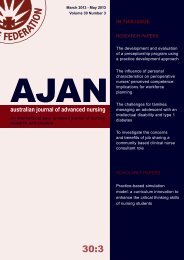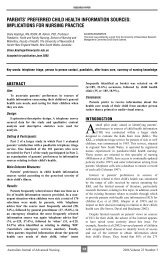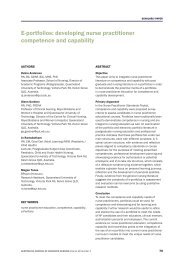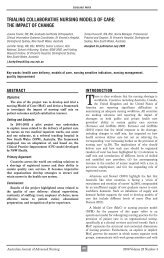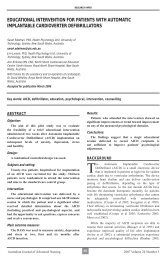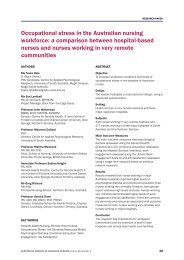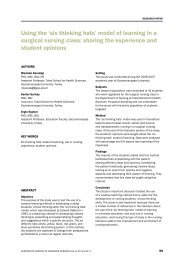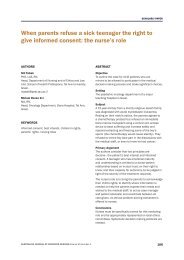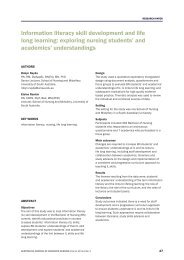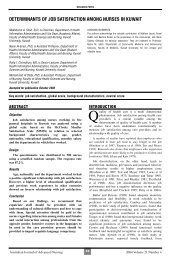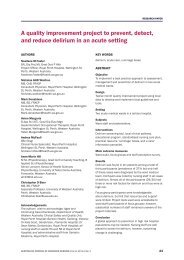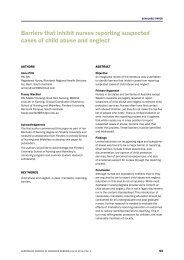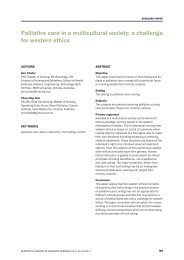australian journal of advanced nursing
australian journal of advanced nursing
australian journal of advanced nursing
Create successful ePaper yourself
Turn your PDF publications into a flip-book with our unique Google optimized e-Paper software.
RESEARCH PAPER<br />
The adaptation <strong>of</strong> probation period <strong>of</strong> employment<br />
on the Aboriginal <strong>nursing</strong> graduates in Taiwan<br />
AUTHORS<br />
Whei‑Mei Jean Shih<br />
RN, MS,<br />
Nursing Instructor, Chang‑Gung Institute <strong>of</strong> Technology,<br />
Taiwan, R.O.C. Wen‑Hua 1 st Road, Kwei‑Shan, Tao‑Yuan,<br />
Taiwan. Nursing PhD Candidate, National Taipei<br />
University <strong>of</strong> Nursing and Sciences, Taiwan.<br />
jeanshih@gw.cgit.edu.tw<br />
Lee‑Ing Tsao<br />
RN, DNS<br />
Pr<strong>of</strong>essor, National Taipei University <strong>of</strong> Nursing and<br />
Sciences, Taiwan.<br />
leeing.tsao@gmail.com<br />
Ying‑Mei Liu<br />
RN, MS<br />
Nursing Instructor, Chang‑Gung Institute <strong>of</strong> Technology,<br />
Taiwan. Doctoral <strong>nursing</strong> student, Chang Gung<br />
University, Taiwan<br />
ymliu@gw.cgit.edu.tw<br />
Su‑Hui Chuang<br />
RN, MS<br />
Assistant Instructor, Chang‑Gung Institute <strong>of</strong><br />
Technology, Taiwan.<br />
shchuan@gw.cgit.edu.tw<br />
Hsiang‑Chun Lee<br />
RN, MS<br />
Nursing Instructor, Chang‑Gung Institute <strong>of</strong> Technology,<br />
Taiwan.<br />
cathylee@gw.cgit.edu.tw<br />
KEY WORDS<br />
aborigines, employment, new graduates, <strong>nursing</strong><br />
education, adaptation<br />
ABSTRACT<br />
Objective<br />
The purpose <strong>of</strong> this study was to explore the<br />
adaptation <strong>of</strong> probation period <strong>of</strong> employment on<br />
Taiwanese aboriginal <strong>nursing</strong> graduates in health care<br />
institutions.<br />
Design<br />
A cross‑sectional, descriptive design using a<br />
questionnaire was employed.<br />
Setting<br />
The setting for the study was an institute <strong>of</strong> technology<br />
in Taiwan <strong>of</strong>fering five‑year, two‑year, four‑year and<br />
graduate vocational <strong>nursing</strong> program.<br />
Subjects<br />
Taiwanese aboriginal <strong>nursing</strong> student graduates<br />
(n=145) were recruited for the study.<br />
Results<br />
Results <strong>of</strong> this study showed out <strong>of</strong> 21 items in<br />
clinical familiarity, only one item ‘realised organisation<br />
culture’ score was fewer than three (out <strong>of</strong> four).<br />
Most graduates felt confident in their job after the<br />
three month probation period. All aboriginal <strong>nursing</strong><br />
graduates felt certain levels <strong>of</strong> influence in health,<br />
leisure activities, social activities, appetite, and sleep.<br />
They also expressed a delay <strong>of</strong> thirty minutes to up to<br />
four hours, in completing their scheduled shift. When<br />
facing difficulties in their work, they were willing to<br />
actively search for solutions. Talking to someone or<br />
partaking in leisure activities were two major methods<br />
<strong>of</strong> coping with stress for these graduates.<br />
Conclusion<br />
The results <strong>of</strong> this study show that the impression <strong>of</strong><br />
nurse educators and clinical managers that aboriginal<br />
<strong>nursing</strong> students are less adapted in clinical settings<br />
than their non‑aboriginal peers may be unfounded.<br />
AUSTRALIAN JOURNAL OF ADVANCED NURSING Volume 28 Number 3 22



